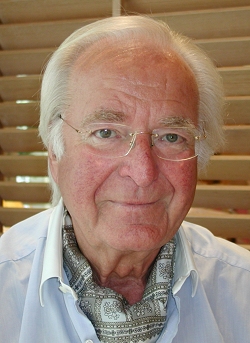Martin Böttcher facts for kids
Martin Böttcher (born June 17, 1927 – died April 20, 2019) was a talented German composer, arranger, and conductor. He created music for many popular films and TV shows.
Contents
Early Life and Music Beginnings
Martin Böttcher started learning to play the piano when he was very young. But his biggest dream was to fly! He wanted to become a test pilot. Before he turned 17, he joined the German Luftwaffe for military training. However, he never got to fly in real missions because there wasn't enough fuel.
While he was a prisoner of war, Martin Böttcher found a guitar and taught himself how to play it. After he was released, he moved to Hamburg. There, he began his music career with a new dance and entertainment orchestra. This orchestra was very well-known, even in England. He also gained important experience helping other film composers arrange their music.
Starting in Film Music
In 1950, Martin Böttcher loved trying out new sounds. He made some of the first "trick guitar" songs in Germany, similar to the style of Les Paul. By 1954, he decided to focus on writing music. The German film industry was growing, and they noticed his talent.
In 1955, film producer Artur Brauner gave Böttcher his first chance to compose for a movie. It was a military comedy called The Captain and His Hero. His second film score was a big moment in German film history. The movie Teenage Wolfpack, starring Horst Buchholz, was a huge success. Böttcher's band for this film included top German jazz musicians, like James Last.
Böttcher also wrote music for famous actors like Hans Albers and Heinz Rühmann. He composed for Rühmann's 'Father Brown' movies, like The Black Sheep. In 1962, his movie Max the Pickpocket featured a song called "Hawaii Tattoo." He wrote this song under the name Michael Thomas. It quickly became famous worldwide and even appeared on the American Billboard charts!
Becoming a Hit Maker
Martin Böttcher found his greatest fame in the 1960s. He composed the music for ten of the popular Karl May films. The first was Der Schatz im Silbersee, which had the famous "Old-Shatterhand-Melodie." These films starred American actor Lex Barker and British actor Stewart Granger. Audiences loved the beautiful melodies, the exciting music during action scenes, and the cheerful country tunes.
Böttcher's main songs from these films became huge hits in Germany. They sold thousands of records. The music for the Winnetou films is a landmark in German film music history. The success of these films, with Böttcher's music, even helped pave the way for "Spaghetti Westerns" and the music of Ennio Morricone.
As the German film industry slowed down in the late 1960s, Martin Böttcher started working more for German TV. His talent was used in many TV films and series.
Music for Television
In the 1970s, Martin Böttcher wrote many successful scores for TV. These included music for the series Sonderdezernat K1 and many episodes of Der Alte and Derrick. These shows were also known outside Germany. He also worked on Karl May's stories again, writing the music for the 26-episode series Kara Ben Nemsi Effendi.
For many years, Martin Böttcher continued to compose memorable themes for TV series. Some of these include It can't always be caviar (1977), Schöne Ferien (Beautiful holidays), and Forsthaus Falkenau. In the 1990s, he worked on Air Albatros. This was a special project for him because he could combine his love for flying with his music. And when Pierre Brice played Winnetou again for the ZDF television station, Martin Böttcher, of course, composed the music.
Even Americans noticed his skills as an arranger and orchestra director. When they heard his versions of famous themes like "Tara's Theme," Martin Böttcher became an honorary member of the Max Steiner Society.
In 1998, his music topped the German charts again. A band from Cologne, the "Superboys," had a hit with a singing version of the "Winnetou-Melodie." Their song "Ich wünscht' du wärst bei mir" ("Wish U Were Here") even reached the top of the ZDF television charts. Another version by the Czech group Těžkej Pokondr called "Vinetu" even earned double-platinum status in their country in 2000.
In 2002, Martin Böttcher was honored in a special way. He was a jury member for a European talent award. He represented Germany at the European Biennale for Film Music in Bonn.
Awards and Recognition
- On October 9, 1995, Martin Böttcher received the Deutsche Filmmusikpreise (German film music awards). He was honored for his "outstanding contribution to German film history." He was the very first person to receive this award.
- Because of the lasting success of his Karl May melodies, he received a "special award" at the Karl May Festival in Bad Segeberg in 1997.
- On April 15, 2000, Martin Böttcher received the "Edgar Wallace Award in Gold." This was for his important work in German crime movies.
- On January 25, 2004, Martin Böttcher was given the German Bundesverdienstkreuz (Federal Cross of Merit) in St. Moritz. This award recognized his achievements throughout his life.
- On May 28, 2009, Martin Böttcher was honored in Berlin with the Deutsche Musikautorenpreis (German music authors’ award) for his film compositions.
- On June 27, 2013, Martin Böttcher received the Look & Listen – Telepool-BR-Music-Award in Munich.
See also
 In Spanish: Martin Böttcher para niños
In Spanish: Martin Böttcher para niños
 | Georgia Louise Harris Brown |
 | Julian Abele |
 | Norma Merrick Sklarek |
 | William Sidney Pittman |


